Fleurs du Mal Magazine


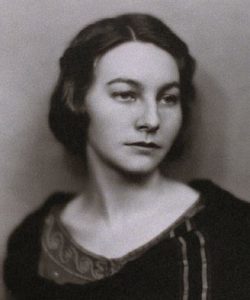
The Vast Hour
All essences of sweetness from the white
Warm day go up in vapor, when the dark
Comes down. Ascends the tune of meadow-lark,
Ascends the noon-time smell of grass, when night
Takes sunlight from the world, and gives it ease.
Mysterious wings have brushed the air; and light
Float all the ghosts of sense and sound and sight;
The silent hive is echoing the bees.
So stir my thoughts at this slow, solemn time.
Now only is there certainty for me
When all the day’s distilled and understood.
Now light meets darkness: now my tendrils climb
In this vast hour, up the living tree,
Where gloom foregathers, and the stern winds brood.
Genevieve Taggard
(1894 – 1948)
The Vast Hour
• fleursdumal.nl magazine
More in: # Classic Poetry Archive, Archive S-T, Archive S-T
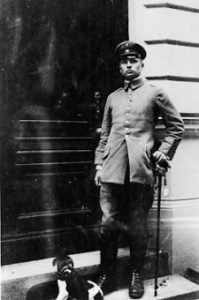
Schwermütig kam die Nacht …
Schwermütig kam die Nacht. Ich bin allein.
Rings wuchern Bücher, Möbel und Tapeten
Im gelben Licht der Lampe fremd und kalt.
Wie weh tun Sehnsucht, Nacht und Einsamsein!
Still möcht ich in dein junges Leben treten
Wie eine Wanderschaft durch einen grünen Wald.
Hans Ehrenbaum-Degele
(1889 – 1915)
Schwermütig kam die Nacht …
• fleursdumal.nl magazine
More in: #Experimental Poetry Archive, *War Poetry Archive, - Archive Tombeau de la jeunesse, Archive E-F, Archive E-F, Expressionism

En la forest de Longue Attente
En la forest de Longue Attente
Entrée suis en une sente
Dont oster je ne puis mon cueur,
Pour quoy je vis en grant langueur,
Par Fortune qui me tourmente.
Souvent Espoir chacun contente,
Excepté moy, povre dolente,
Qui nuit et jour suis en douleur
En la forest de Longue Attente.
Ay je dont tort, se je garmente
Plus que nulle qui soit vivante ?
Par Dieu, nannil, veu mon malheur,
Car ainsi m’aid mon Createur
Qu’il n’est peine que je ne sente
En la forest de Longue Attente.
Marie De CLÈVES
(1426-1487)
En la forest de Longue Attente
• fleursdumal.nl magazine
More in: # Classic Poetry Archive, Archive C-D, Archive C-D
This keenly anticipated new collection from the Costa Poetry Award-winner speaks ‘out of fear and grief into splendour and joy’.
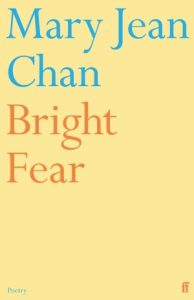 Following their award-winning debut, Flèche (2019), comes Mary Jean Chan’s gleaming second collection: Bright Fear. Through poems which engage fearlessly with intertwined themes of identity, multilingualism and postcolonial legacy, Chan’s latest work explores a family’s evolving dynamics, as well as microaggressions stemming from queerphobia and anti-Asian racism that accompanied the Covid pandemic.
Following their award-winning debut, Flèche (2019), comes Mary Jean Chan’s gleaming second collection: Bright Fear. Through poems which engage fearlessly with intertwined themes of identity, multilingualism and postcolonial legacy, Chan’s latest work explores a family’s evolving dynamics, as well as microaggressions stemming from queerphobia and anti-Asian racism that accompanied the Covid pandemic.
Yet Bright Fear remains deeply attuned to moments of beauty, tenderness and grace. It asks how we might find a home within our own bodies, in places both distant and near, and in the ‘constructed space’ of the poem. The contemplative central sequence, Ars Poetica, traces the radically healing and transformative role of poetry during the poet’s teenage and adult years, culminating in a polyphonic reconciliation of tongues. Throughout, Chan offers us new and galvanising ways to ‘withstand the quotidian tug- / of-war between terror and love’.
Mary Jean Chan is the author of Flèche (Faber, 2019), which won the Costa Book Award for Poetry and was shortlisted for the International Dylan Thomas Prize, the John Pollard Foundation International Poetry Prize, the Jhalak Prize, the Seamus Heaney Centre First Collection Poetry Prize and a Lambda Literary Award. Chan won the 2018 Geoffrey Dearmer Prize and was shortlisted for the Forward Prize for Best Single Poem in 2017 and 2019, receiving an Eric Gregory Award in 2019. Chan co-edited the anthology 100 Queer Poems (Vintage, 2022) with Andrew McMillan, and is a judge for the 2023 Booker Prize. Born and raised in Hong Kong, Chan serves as Senior Lecturer in Creative Writing (Poetry) at Oxford Brookes University and lives in Oxford.
Most mornings, you see the face
of a boy in the mirror. You
expect to fall in love with him,
someday. Meanwhile, your fingers
brush the wrist of another girl as
you jostle into the assembly hall,
and you understand that sin was
never meant to be easy, only
sweet. What might light up the
pond you sat beside in dreams,
eyeing skin and so much depth it
would be years before you dared?
What curvature of tongue might
you taste, as if another’s breath
were blessing? One night, you find
yourself back there. You dream.
A voice says: Hell is not other
people. You sink, stripped of the
glowing dress you wore for
thousands of days.
(fragment poem)
Bright Fear
by Mary Jean Chan
(Poems)
Publisher: Faber & Faber;
Main edition
3 August 2023
Language: English
ISBN-10: 0571378900
ISBN-13: 978-0571378906
Dimensions: 15.8 x 0.6 x 20.5 cm
Paperback
72 pages
£10.99
• fleursdumal.nl magazine
More in: #Editors Choice Archiv, - Book News, - Bookstores, Archive C-D, Archive C-D, Racism

Gebet
Urewiger!
Unendlicher!
Du hörst das Schreien
Der ringenden Seele.
Zu Dir geflüchtet
Bin ich in Stunden,
Wo Dir entfremdet
Und Dich verhöhnend,
In Schmutz und Sünde
Sich Jene wälzten,
Die gestern lobpriesen
Dein heiliges Wort,
Die morgen wieder
Vor Deinem Kreuze
Im Staub sich winden,
Ein heiliges Antlitz
Und heilige Sitten
Frommlächelnd zeigen. –
O ewiges Wesen
Barmherzig bist Du,
Du bist milde,
Göttlich, gütig! –
Ich glaube an Dich,
Ich hoffe auf Dich,
Und wenn auch versinkend,
Ruf ich zu Dir!
Du hörst dies Rufen …..
Der Krämerseelen
Erbärmlich Winseln
Dringt nicht an Dein Ohr:
Doch dort, wo Jammer
Und große Schuld
Vor Dir sich beugen
In schmerzlicher Reue,
Dort, wo beladen
Mit menschlichem Elend,
Von Dir ein Wesen,
Sündenmüde,
Lebensmüde,
Erlösung heischt,
Dort wirst Du hören, –
Denn Du bist Gott!
Ada Christen
(1839 – 1901)
Gebet
• fleursdumal.nl magazine
More in: Archive C-D, Archive C-D, Christen, Ada
Inspiring oral histories of women fighting for justice and radical social change at community, state, and national levels.
 Award-winning oral historian Lynn Lewis brings together the stories of nine exceptional women, from their earliest formative experiences to their current strategies as movement leaders, organizers, and cultural workers.
Award-winning oral historian Lynn Lewis brings together the stories of nine exceptional women, from their earliest formative experiences to their current strategies as movement leaders, organizers, and cultural workers.
Each chapter is dedicated to one activist—Malkia Devich-Cyril, Priscilla Gonzalez, Terese Howard, Hilary Moore, Vanessa Nosie, Roz Pelles, Loretta Ross, Yomara Velez, and Betty Yu.
Reflecting upon the path their lives have taken, they talk about their struggles and aspirations, insights and victories, and what keeps them in the fight for a better world.
The life stories of these inspiring women reveal the many ways the experience of injustice can catalyze resistance and a commitment to making change. They demonstrate how the relationships and bonds of collective struggle for the common good not only win justice, but create hope, love, and joy.
Lynn Lewis (editor) is an oral historian, educator, and community organizer. She is the author of Love and Collective Resistance: Lessons from the Picture the Homeless Oral History Project and is the former executive director and past civil rights organizer at Picture the Homeless. Lewis is the recipient of many honors and awards, including a 2022/2023 National Endowment for the Humanities Oral History Fellowship. She lives in New York City.
Women Who Change the World:
Stories from the Fight for Social Justice
by Lynn Lewis (Editor)
ISBN-13: 9780872868748
Publisher: City Lights Books
Series: City Lights Open Media
Publication date: 08/29/2023
Pages: 280
Paperback
$17.95
• fleursdumal.nl magazine
More in: - Book News, - Bookstores, Archive K-L, AUDIO, CINEMA, RADIO & TV, Black Lives Matter, Feminism, Racism, Workers of the World

Skull Song
A sea-god, whose father had been a mortal, becomes a skeleton.
The skin of the sea was thick, to-night,
And the tone of the sea was dull;
When I found by the edge of the sullen sea
The half of a sea-god’s skull.
Half of a sea-god’s skull was there,
Half of a sea-god’s tail.
When I dug them out of the clutch of the sand
The peering moon went pale.
The peering moon went pale, because
Her other eye had seen
The other half of the sea-god’s bones
Ten thousand fathom green . . .
Ten thousand fathom green with sea,
The sea-god’s other bones
Swayed in a dead sea-goddess’s arms
On a pile of sea-washed stones.
The skin of the sea was thick, to-night,
And the tone of the sea was dull,
While I buried away from the sinister sea
All the mortal part of a skull.
Genevieve Taggard
(1894 – 1948)
Skull Song
• fleursdumal.nl magazine
More in: # Classic Poetry Archive, Archive S-T, Archive S-T
In her first book of poems since the scintillating More Anon: Selected Poems, Maureen N. McLane offers a bravura, trenchant sounding out of inner and outer weathers.
What You Want is a book of core landscapes, mindscapes, and shifting moods. Meditative, lyrical, alert to seasons and pressures on our shared life, McLane registers and shapes an ambient unease.
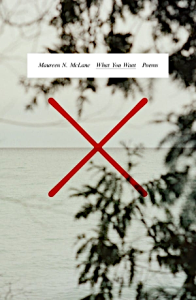 Whether skying with John Constable or walking on wintry paths in our precarious republic, the poet channels what Wordsworth called “moods of my own mind” while she scans for our common horizon.
Whether skying with John Constable or walking on wintry paths in our precarious republic, the poet channels what Wordsworth called “moods of my own mind” while she scans for our common horizon.
Here are poems filled with gulls and harbors, blinking red lights and empty lobster traps, beach roses and rumored sharks, eels and crows, wind turbines and superhighways.
From Sappho to the Luminist painter Fitz Henry Lane, from constellations to microplastics, What You Want is a book alive to the cosmos as well as to our moment, with its many vexations and intermittent illuminations.
In poems of powerful command and delicate invitation, moving from swift notations to sustained sequences, this collection sees McLane testing what (if anything) might “outlast the coming heat.”
And meanwhile, “There’s no end / to beauty and shit.”
Maureen N. McLane is a poet, memoirist, critic, and educator. She has published eight books of poetry, including This Blue, Finalist for the National Book Award, and Some Say, Finalist for the Audre Lorde/Publishing Triangle Award and for The Believer Award in Poetry. She is also the author of an experimental hybrid of memoir and criticism, My Poets, a New York Times Notable Book. Other works include two monographs on British romantic poetics and numerous essays on romantic-era and contemporary literature and culture. Her poems have been translated into Italian, French, Greek, Spanish, and Czech and have recently appeared in the London Review of Books, Poesia, The New York Review of Books, and The Yale Review. Her essays have appeared in the LRB, The New York Times Book Review, and the Los Angeles Review of Books. She is the Henry James Professor of English and American Letters at New York University. Her latest book is What You Want: poems, just out from Farrar, Straus and Giroux and Penguin UK.
What You Want.
Poem
by Maureen N. McLane
Publisher: Farrar, Straus and Giroux (2 mei 2023)
Language: English
128 pages
ISBN-10 0374607257
ISBN-13 978-0374607258
Hardcover
$27.00
• fleursdumal.nl magazine
More in: #Editors Choice Archiv, Archive M-N, Archive M-N
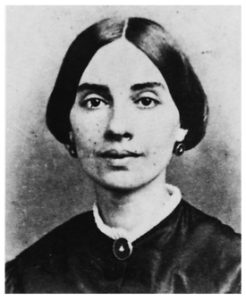
We talked as Girls do
We talked as Girls do –
Fond, and late –
We speculated fair, on every subject, but the Grave –
Of ours, none affair –
We handled Destinies, as cool –
As we – Disposers – be –
And God, a Quiet Party
to our authority –
But fondest, dwelt upon Ourself
As we eventual – be –
When Girls, to Women, softly raised
We – occupy – Degree –
We parted with a contract
To cherish, and to write
But Heaven made both, impossible
Before another night.
Emily Dickinson
(1830-1886)
We talked as Girls do
• fleursdumal.nl magazine
More in: Archive C-D, Archive C-D, Dickinson, Emily
Beautiful in the Mouth was selected by Thomas Lux as winner of BOA’s A. Poulin, Jr., Poetry Prize and it debuted in the top ten on the Poetry Foundation bestseller list.
 In it, Kuipers combines frank sensuality with sincere emotion, yielding poems that travel from New York City to the American West on a exploration of love and loss.
In it, Kuipers combines frank sensuality with sincere emotion, yielding poems that travel from New York City to the American West on a exploration of love and loss.
Set against both literal and figurative geography—the empty bedroom of a dead child, a clear-cut hillside outside a logging town—these poems examine how loss transforms our most unwilling landscapes.
Thomas Lux selected this debut collection as winner of BOA’s A. Poulin, Jr., Poetry Prize.
In his foreword he writes, “I was immediately struck by the boldness of imagination, the strange cadences, and wild music of these poems.
We should be glad that young poets like Keetje Kuipers are making their voices heard not by tearing up the old language but by making the old language new.”
Keetje Kuipers, a native of the Northwest, earned her BA at Swarthmore College and MFA at the University of Oregon. A Stegner Fellow at Stanford University, she divides her time between Stanford and Missoula, Montana.
Beautiful in the Mouth
(A. Poulin, Jr. New Poets of America)
by Keetje Kuipers (Author),
Thomas Lux (Foreword)
Paperback
2010
Publisher: BOA Editions Ltd.; First Edition (April 1, 2010)
Language: English
Paperback: 96 pages
ISBN-10: 1934414336
ISBN-13: 978-1934414330
$17.00
• fleursdumal.nl magazine
More in: #Modern Poetry Archive, - Book News, - Bookstores, Archive K-L, Archive K-L, Kuipers, Keetje

Rondel of Merciless Beauty
Your two great eyes will slay me suddenly;
Their beauty shakes me who was once serene;
Straight through my heart the wound is quick and keen.
Only your word will heal the injury
To my hurt heart, while yet the wound is clean –
Your two great eyes will slay me suddenly;
Their beauty shakes me who was once serene.
Upon my word, I tell you faithfully
Through life and after death you are my queen;
For with my death the whole truth shall be seen.
Your two great eyes will slay me suddenly;
Their beauty shakes me who was once serene;
Straight through my heart the wound is quick and keen.
Geoffrey Chaucer
(1343 – 1400)
Rondel of Merciless Beauty
• fleursdumal.nl magazine
More in: Archive C-D, Archive C-D, Geoffrey Chaucer
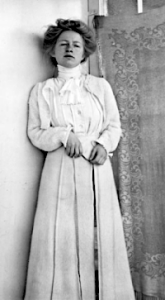
Skönhet
Vad är skönhet? Fråga alla själar –
skönhet är varje överflöd, varje glöd, varje överfyllnad och varje stort armod;
skönhet är att vara sommaren trogen och naken intill hösten;
skönhet är papegojans fjäderskrud eller solnedgången som bebådar storm;
skönhet är ett skarpt drag och ett eget tonfall: det är jag,
skönhet är en stor förlust och ett tigande sorgetåg,
skönhet är solfjäderns lätta slag som väcker ödets fläkt;
skönhet är att vara vällustig som rosen eller att förlåta allting för att solen skiner;
skönhet är korset munken valt eller pärlbandet damen får av sin älskare,
skönhet är icke den tunna såsen i vilken diktare servera sig själva,
skönhet är att föra krig och söka lycka,
skönhet är att tjäna högre makter.
Edith Södergran
(1892-1923)
Skönhet
• fleursdumal.nl magazine
More in: Archive S-T, Archive S-T, Södergran, Edith
Thank you for reading Fleurs du Mal - magazine for art & literature